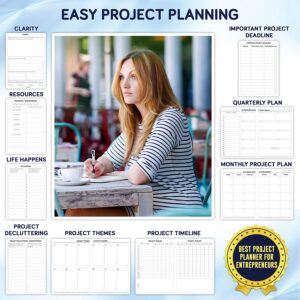In today’s fast-paced and competitive business world, managing and prioritizing multiple projects at once has become essential for success. However, juggling numerous projects simultaneously can be a daunting task, especially if you lack effective strategies and tools to stay organized and focused. In this blog post, we will share practical tips and best practices to help you manage and prioritize multiple projects efficiently while ensuring timely delivery, high quality, and customer satisfaction.
Defining Goals, Plans, Responsibilities, and Expectations
Starting off on the right foot is crucial when managing multiple projects. The first step is to define a clear set of goals, plans, responsibilities, and expectations for each project. This creates a solid foundation for successful project management, ensuring everyone involved is on the same page.
Categorize Your Projects Based on Urgency
After defining goals, plans, responsibilities, and expectations, it’s time to categorize your projects based on urgency. Prioritizing your urgent projects ensures that you meet your deadlines and fulfill your commitments. An important project doesn’t necessarily have a closer deadline than an urgent project, but it is crucial for long-term success.
Leverage Resources to Manage Multiple Projects
To effectively manage multiple projects, leveraging resources is a key strategy. By taking advantage of every tool at your disposal, you can better manage your time, stay organized, and streamline your workflows.
Time Blocking for Improved Productivity
To move forward with managing multiple projects effectively, it is essential to utilize time blocking. This productivity technique involves scheduling specific time slots for each task, which ensures that your attention remains focused and distractions are minimized. By using time blocking, you can allocate enough time to each project according to its importance and urgency, and improve overall productivity. To achieve maximum output, one must actively eliminate distractions and work on a single task at a time. Incorporating time blocking into your daily routine can lead to improved efficiency, enhanced concentration, and significant progress across all projects. By implementing these techniques and best practices, project managers can better manage their workload while maintaining productivity and quality output.

Plan Ahead with an Integrated Schedule
It is essential to create a realistic project plan that visualizes milestones and deadlines against the weeks and months ahead. Time blocking and categorizing projects based on urgency can help to improve productivity and manage competing deadlines. An integrated schedule consolidates all workflows in one place and ensures that nothing is overlooked or forgotten. By planning ahead, one can tackle multiple tasks and be available for various meetings without compromising on quality.
Consolidate All Workflows in One Place
To effectively manage multiple projects, it’s important to consolidate all workflows in one place. By doing so, you’ll have a clear understanding of all ongoing projects, their progress, and upcoming deadlines. Utilizing a single Work OS will ensure that all workflows, documents, and communication channels are structured in one place. This way, you’ll be able to stay organized, avoid confusion, and easily access any information you need. It’s a great way to streamline operations and save time, which can be spent on more important tasks. Once you have consolidated all workflows, it’s also useful to delegate tasks to team members, allowing for more efficient time management.
Monitor Progress and Make Adjustments as Needed.
It’s important to monitor progress and make adjustments as needed. This means regularly checking in on the status of each project and assessing whether any changes need to be made to keep everything on track. It’s also important to communicate any updates or changes to team members and clients as necessary to ensure everyone is on the same page. Project management software can be a helpful tool for tracking progress and making adjustments in real-time.
Stay Flexible
Being flexible is crucial for entrepreneurs managing multiple projects. It allows for adapting to changing circumstances, prioritizing tasks, and managing time effectively. Openness to new ideas and feedback improves decision-making. Setting clear goals, breaking down projects, and adjusting plans when necessary helps to stay flexible. Effective communication with team members and stakeholders is also essential. Embracing flexibility helps navigate challenges and achieve success.









